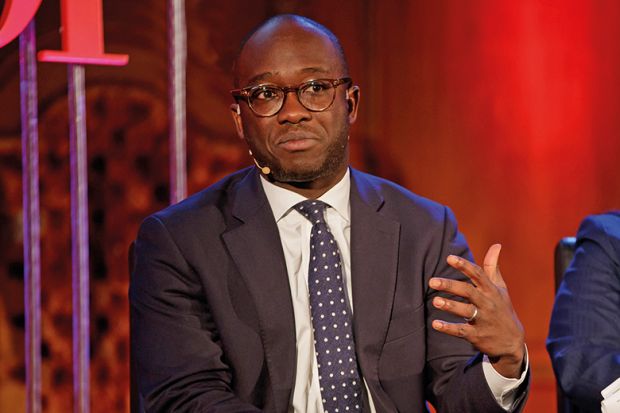The universities minister has criticised the “whole movement around cultural misappropriation” that he said would stop white British students holding an event such as a “Chinese party”, along with a perceived hostility to figures such as Nigel Farage on campus.
Sam Gyimah’s latest comments about campus free speech came during an interview on the subject of “the future of the Conservatives and higher education” as part of the fringe programme at the Tory conference in Birmingham.
Amatey Doku, National Union of Students vice-president for higher education, asked the minister from the audience “whether or not, when you go and tour the country and listen to students, free speech comes out as a priority for students?” He added: “For us, when we speak to students, the issues of mental health, housing, come way, way above that issue – yet in the media…you would think it is one of the most important issues.”
Mr Gyimah answered that to judge the issue of free speech on whether controversial events were going ahead on campus was “the wrong metric” – and that the question was a broader one of “culture” in universities.
“My challenge around universities is mainly…how you conduct debate,” he added.
Mr Gyimah, who had not raised free speech in his interview with George Eaton of the New Statesman, said: “You can still have events going ahead, but still have a culture where people are not really arguing or debating on the basis of rigour. It’s all about ‘would you take it back, would you stop doing that, I don’t really want to listen to your views’.”
There was a need for “genuine diversity of ideas on campus”, he said. “Too often you can have a tendency towards a monoculture. Where there are things that everyone kind of agrees with and so long as you are discussing issues that everyone kind of agrees with, it’s fine. But if you are Nigel Farage – and Nigel Farage is not my best friend – but you pop on campus, that’s not acceptable.”
Mr Gyimah, appearing to refer to events around a 2015 speech given by Maryam Namazie at Goldsmiths, University of London, referred to a case involving “a lady who’s a Muslim who’s left the faith [and] is giving a speech about blasphemy and apostasy…Obviously the Islamic society is not very happy with this. She’s a feminist.
“But when the feminist society [get] involved, [it doesn’t] support the feminists, [it supports] the Islamic society. Because that is the right on thing to do. That’s an example of where a monoculture just completely turns the logic upside down.”
Mr Gyimah also criticised the notion that “you can only comment on an issue if you’re from the designated silo”.
He continued: “There’s an issue around black disadvantage: ‘You’d better not comment because what do you know about it?’ That’s how the debate happens. Or there’s an issue around women: ‘What does someone else know about it? They are a white, 50-year-old male, they can’t comment.’…Inadvertently, there’s a culture that narrows the scope for disagreement and narrows the environment through which you can debate.”
The minister also said: “When you are discussing the issue of black under-attainment at university. Someone will immediately say ‘it’s because the curriculum is too white’. Once it becomes a debate about the curriculum being too white some people are shut out of that debate completely.”
And Mr Gyimah referred to “this whole movement about cultural misappropriation. If you’re a white British student and you decide to have a freshers’ party that’s a Chinese party you’ll probably have someone saying to you ‘that’s cultural misappropriation, you can’t do that’.
“These are all areas in which you are narrowing the scope for free expression, even though you might have events that are going on. If we want have people who are peacemakers – lawyers, politicians, whatever, in future – who can see the other person’s point of view, then we need to start in our schools and our universities in how we conduct our debate.”
Register to continue
Why register?
- Registration is free and only takes a moment
- Once registered, you can read 3 articles a month
- Sign up for our newsletter
Subscribe
Or subscribe for unlimited access to:
- Unlimited access to news, views, insights & reviews
- Digital editions
- Digital access to THE’s university and college rankings analysis
Already registered or a current subscriber?







